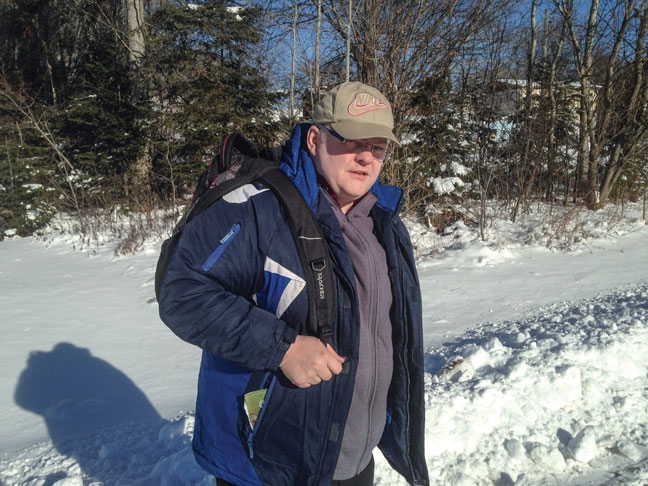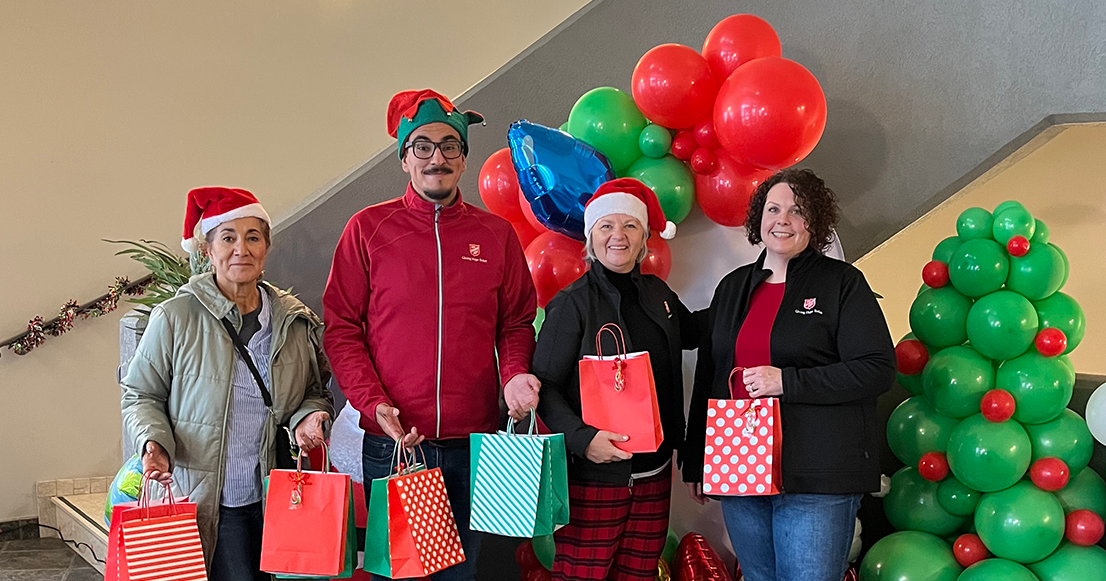In the winter of 1888, General William Booth was disturbed when he saw homeless people sleeping rough under a bridge in London, England. He demanded to know if his son, Bramwell, the Army's Chief of the Staff, was aware of the situation. When Bramwell admitted that he was, General Booth barked, “Do something, Bramwell! Do something!”
My wife and I were appointed to Fredericton Community Church last summer. We operate a busy community and family services office and partner with a number of other agencies, particularly those focused on homelessness. Reports estimate that there are 50 to 60 “street” homeless persons in Fredericton—37 have shelter beds, while the rest sleep rough.
Seeing the homeless on the streets, and engaging in conversation with our community partners, I heard within my own soul the call of the founder to “do something.” I decided that I needed to experience first-hand what it is like to be homeless on the streets of Fredericton.
So, one Friday last fall, I left the warmth and comfort of my home and wandered the city streets for the night. I realize that my experience was somewhat inauthentic—I knew that I could return to my “real life” at any time. But this exercise gave me the opportunity to talk to and learn from people who live that experience every day.
Out on the street with nowhere to go, I couldn't escape the thought that I was crazy to be doing this, but I was not afraid in the slightest. I believed God had sent me out on a mission and that he would protect me.
I headed for the tent city along the riverbank, only to find it gone—the authorities had dismantled it and dispersed the residents. Then I went to the men's shelter but found the door locked (a normal security practice for them). I knew that they were struggling with over-occupancy, so I didn't bother to ring the doorbell.
I met a 37-year-old man, who became my friend, near the men's shelter. He was sitting on the curb, strumming a broken guitar. We talked about various issues that affect the homeless, including eating food from garbage cans—a conversation I revisited as I sat down to my own elaborate Thanksgiving dinner a few weeks later. He gave me tips on where to find warm places to sleep.
Eventually, he invited me to his “home”—a covered concrete stairwell. This was where he stored all of his earthly belongings (a sleeping bag and pillow), and where he took shelter when it was cold or wet. I appreciated his hospitality; he had nothing, but he shared his nothing with me.
As we talked, I learned that he expected to spend the rest of his life living on those stairs. He had no expectation of change, knowing that it was his own unbreakable drug addiction that kept him there. My heart went out to him. This was a smart, funny young person, simply enduring life, living without hope. No human being should have to live that way.
I will always be grateful to have met this man, from whom I learned so much—not only about homelessness, but also about myself and my faith. I learned how demeaning it is to be homeless, how invisible the homeless feel. Most of the people who saw me refused to make eye contact, pretending that I was not there. Others screwed up their faces in disgust while crossing the street to avoid me. A few others gave sympathetic smiles as they cautiously passed by. The experience was humiliating and degrading.
I also learned that I have been guilty of apathy when it comes to homelessness. It's not enough to pray for the homeless and hope that they'll be OK out in the cold—that's not loving my neighbour. Christ calls us to be his ambassadors, offering real, practical help that will change people's lives. That's what holiness is all about: bringing health and wholeness to a broken world. God's salvation is not just a spiritual experience; it's also physical, emotional and social. As Christians, we can be agents of salvation for the people around us.
In the parable of the sheep and the goats, Jesus tells us, “Whatever you did for one of the least of these brothers and sisters of mine, you did for me” (see Matthew 25:31-46). We have an obligation to help the poor and marginalized in our society. No one should be left to hopelessly live out their days on the street. How can we do something to change that?
My wife and I were appointed to Fredericton Community Church last summer. We operate a busy community and family services office and partner with a number of other agencies, particularly those focused on homelessness. Reports estimate that there are 50 to 60 “street” homeless persons in Fredericton—37 have shelter beds, while the rest sleep rough.
Seeing the homeless on the streets, and engaging in conversation with our community partners, I heard within my own soul the call of the founder to “do something.” I decided that I needed to experience first-hand what it is like to be homeless on the streets of Fredericton.
So, one Friday last fall, I left the warmth and comfort of my home and wandered the city streets for the night. I realize that my experience was somewhat inauthentic—I knew that I could return to my “real life” at any time. But this exercise gave me the opportunity to talk to and learn from people who live that experience every day.
Out on the street with nowhere to go, I couldn't escape the thought that I was crazy to be doing this, but I was not afraid in the slightest. I believed God had sent me out on a mission and that he would protect me.
I headed for the tent city along the riverbank, only to find it gone—the authorities had dismantled it and dispersed the residents. Then I went to the men's shelter but found the door locked (a normal security practice for them). I knew that they were struggling with over-occupancy, so I didn't bother to ring the doorbell.
I met a 37-year-old man, who became my friend, near the men's shelter. He was sitting on the curb, strumming a broken guitar. We talked about various issues that affect the homeless, including eating food from garbage cans—a conversation I revisited as I sat down to my own elaborate Thanksgiving dinner a few weeks later. He gave me tips on where to find warm places to sleep.
Eventually, he invited me to his “home”—a covered concrete stairwell. This was where he stored all of his earthly belongings (a sleeping bag and pillow), and where he took shelter when it was cold or wet. I appreciated his hospitality; he had nothing, but he shared his nothing with me.
As we talked, I learned that he expected to spend the rest of his life living on those stairs. He had no expectation of change, knowing that it was his own unbreakable drug addiction that kept him there. My heart went out to him. This was a smart, funny young person, simply enduring life, living without hope. No human being should have to live that way.
I will always be grateful to have met this man, from whom I learned so much—not only about homelessness, but also about myself and my faith. I learned how demeaning it is to be homeless, how invisible the homeless feel. Most of the people who saw me refused to make eye contact, pretending that I was not there. Others screwed up their faces in disgust while crossing the street to avoid me. A few others gave sympathetic smiles as they cautiously passed by. The experience was humiliating and degrading.
I also learned that I have been guilty of apathy when it comes to homelessness. It's not enough to pray for the homeless and hope that they'll be OK out in the cold—that's not loving my neighbour. Christ calls us to be his ambassadors, offering real, practical help that will change people's lives. That's what holiness is all about: bringing health and wholeness to a broken world. God's salvation is not just a spiritual experience; it's also physical, emotional and social. As Christians, we can be agents of salvation for the people around us.
In the parable of the sheep and the goats, Jesus tells us, “Whatever you did for one of the least of these brothers and sisters of mine, you did for me” (see Matthew 25:31-46). We have an obligation to help the poor and marginalized in our society. No one should be left to hopelessly live out their days on the street. How can we do something to change that?










Leave a Comment